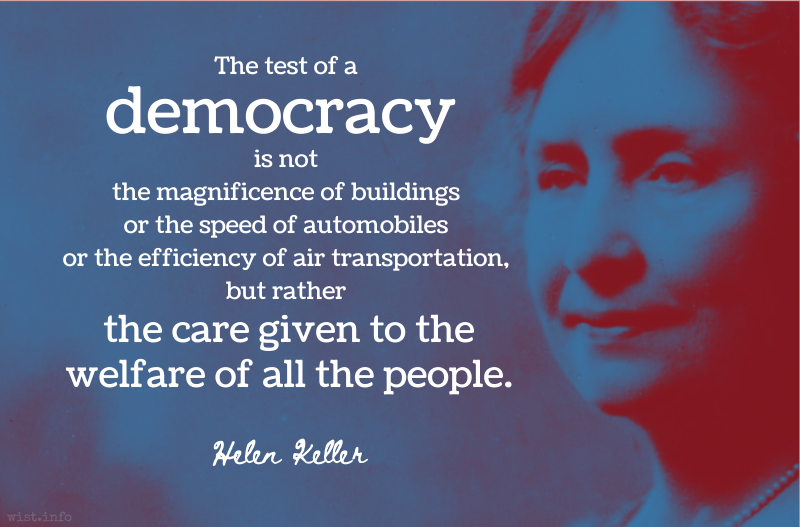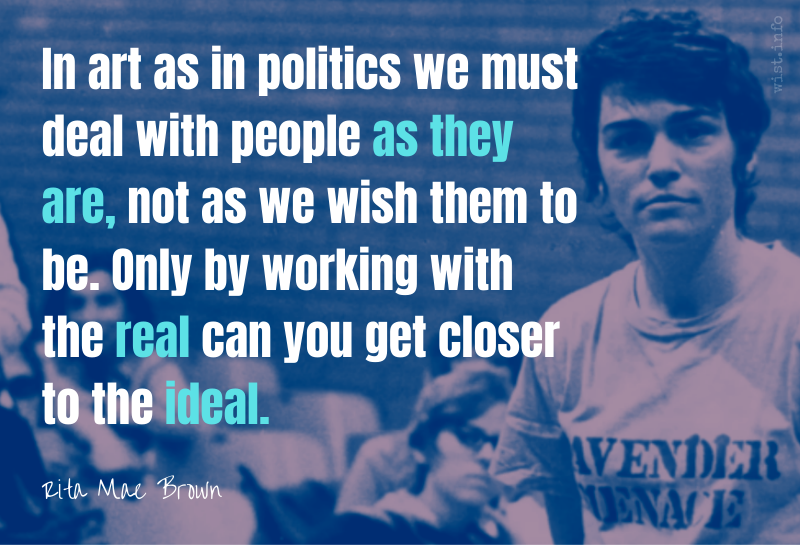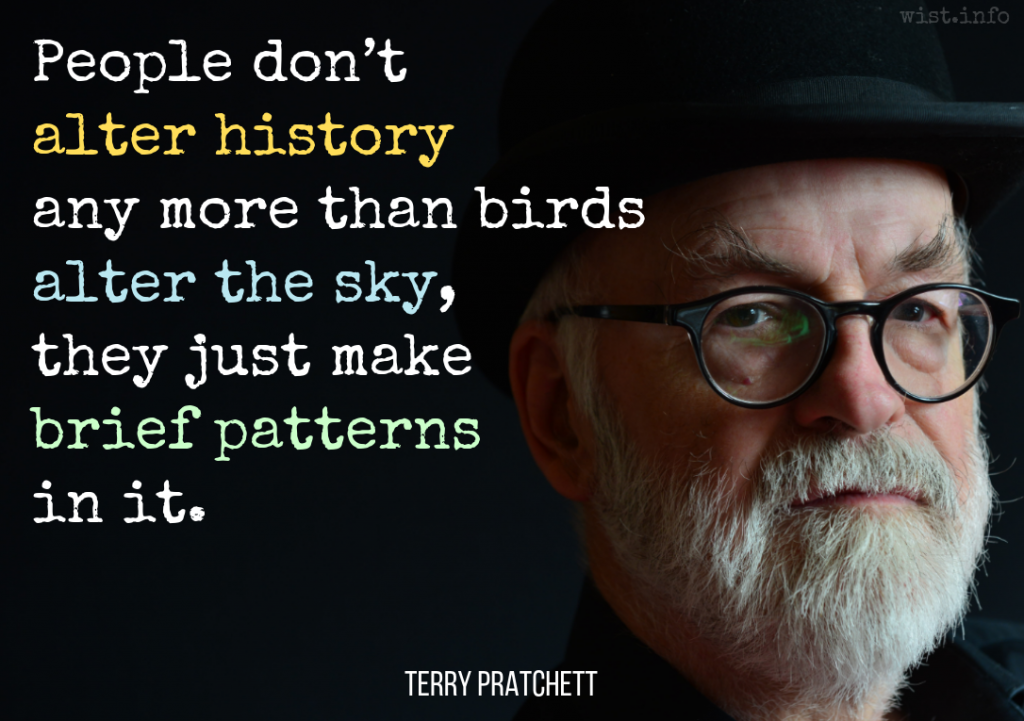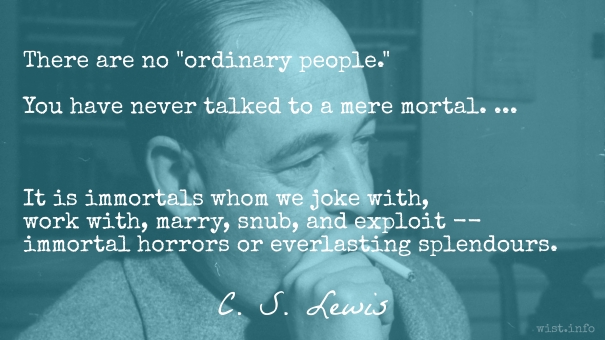We lavish on animals the love we are afraid to show to people. People might not return it; or worse, they might.
Mignon McLaughlin (1913-1983) American journalist and author
The Neurotic’s Notebook, ch. 1 (1963)
(Source)
Quotations about:
people
Note not all quotations have been tagged, so Search may find additional quotes on this topic.
To found the reward for virtuous actions on the approval of others is to choose too uncertain and shaky a foundation. Especially in an age as corrupt and ignorant as this, the good opinion of the people is a dishonor. Whom can you trust to see what is praiseworthy?
[De fonder la recompence des actions vertueuses, sur l’approbation d’autruy, c’est prendre un trop incertain et trouble fondement, signamment en un siecle corrompu et ignorant, comme cettuy cy la bonne estime du peuple est injurieuse. A qui vous fiez vous, de veoir ce qui est louable?]Michel de Montaigne (1533-1592) French essayist
Essays, Book 3, ch. 2 “Of Repentence [Du Repentir]” (1586) (3.2) (1595) [tr. Frame (1943)]
(Source)
This essay first appeared in the 1588 ed. The second sentence/phrase (on the age being so corrupt) and following were added for the 1595 ed.
(Source (French)). Alternate translations:
To ground the recompence of vertuous actions, upon the approbation of others, is to undertake a most uncertaine or troubled foundation, namely in an age so corrupt and times so ignorant, as this is: the vulgar peoples good opinion is injurious. Whom trust you in seeing what is commendable?
[tr. Florio (1603)]
To ground the Recompence of virtuous Actions upon the Approbation of others, is too uncertain and unsafe a Foundation; especially in so corrupt and ignorant an Age as this, the good Opinion of the Vulgar is injurious. Upon whom do you relie to shew you what is recommendable?
[tr. Cotton (1686)]
To ground the recompense of virtuous actions upon the approbation of others is too uncertain and unsafe a foundation, especially in so corrupt and ignorant an age as this, wherein the good opinion of the vulgar is injurious: upon whom do you rely to show you what is recommendable?
[tr. Cotton/Hazlitt (1877)]
To base the reward of virtuous actions on the approbation of others is to choose a too uncertain and obscure foundation. Especially in a corrupt and ignorant age like this, the good opinion of the vulgar is offensive; to whom do you trust to perceive what is praiseworthy?
[tr. Ives (1925)]
Basing the recompense of virtuous deeds on another’s approbation is to accept too uncertain and confused a foundation -- especially since in a corrupt and ignorant period like our own to be in good esteem with the masses is an insult: whom would you trust to recognize what was worthy of praise!
[tr. Screech (1987)]
The nobility, say nobles, serves as intermediary between king and people. True, just as the hound serves as intermediary between hunter and hares.
[«La noblesse, disent les nobles, est une intermédiaire entre le roi et le peuple…» Oui, comme le chien de chasse est un intermédiaire entre le chasseur et les lièvres.]Nicolas Chamfort (1741-1794) French writer, epigrammist (b. Nicolas-Sébastien Roch)
Products of Perfected Civilization [Produits de la Civilisation Perfectionée], Part 1 “Maxims and Thoughts [Maximes et Pensées],” ch. 8, ¶ 511 (1795) [tr. Dusinberre (1992)]
(Source)
(Source (French)). Alternate translations:
The nobility, say the nobles, is an intermediary between the king and the people.... Precisely; just as the hound is the intermediary between the huntsman and the hares.
[tr. Hutchinson (1902)]
The Nobility, its members say, is an intermediary between the King and the People. .... Exactly, just as hounds are intermediary between men and hares.
[tr. Mathers (1926), ¶ 512]
“The nobility,” say the nobles, “is an intermediary between the king and the people . . .” No doubt: just as the hunting dog is an intermediary between the hunter and the hares.
[tr. Merwin (1969)]
"The nobility," say the nobles, "is a go-between twixt the king and the people ..." Yes, just as the hunting dog is the go-between twixt the huntsman and the hares.
[tr. Pearson (1973)]
"The nobility", say the nobles, "is an intermediary between the king and the people ..." Yes, like a hunting dog is an intermediary between a hunter and hares.
[tr. Siniscalchi (1994), ¶ 511]
"We're the intermediary between the king and his subjects," claim the nobility. Yes indeed -- and the hound is the intermediary between the hunter and the hare.
[tr. Parmée (2003), ¶ 269]
Books are embalmed minds; they make the great of other days our present teachers. Through books we look, as through “a glass darkly,” upon those vast multitudes whose bodies have passed to dust, and form the earth we tread upon, and through them we, in our turn, shall be made known to coming time.
Christian Nestell Bovee (1820-1904) American epigrammatist, writer, publisher
Intuitions and Summaries of Thought, Vol. 1, “Books” (1862)
(Source)
The principle of Toryism is mistrust of the people, qualified by fear; the principle of Liberalism is trust in the people, qualified by prudence.
William Gladstone (1809-1898) English Liberal politician, Prime Minister (1868-74, 1880-85, 1886, 1892-94)
Inscription on bust, National Liberal Club, London
(Source)
This quotation, or versions of it, are certainly associated to Gladstone, but with enough variants to make concrete attribution difficult. Sometimes given with "Conservatism" substituted for "Toryism." Sometimes quoted in the opposite order. Some renditions use "tempered" rather than "qualified" for one or the other clause, e.g.,:
Liberalism is trust of the people, tempered by prudence; Conservatism, distrust of the people, tempered by fear.
The principle of Liberalism is trust in the people, qualified by prudence. The principle of Conservatism is mistrust of the people qualified by fear.
One party is influenced by trust of the people tempered by prudence, the other by distrust of the people tempered by fear.
The phrase has been attributed to speeches given in Oxford and Chester and in disparate dates from 1866, to 1872, to 1877. It is altogether likely he used different variations at multiple times. Two uses where I could find decent citations:
I think that the principle of the Conservative Party is jealousy of liberty and of the people, only qualified by fear; but I think the principle of the Liberal Party is trust in the people, only qualified by prudence.
[Speech, Opening of the Palmerston Club, Oxford (Dec 1878)]
[His policy of] trust in the people, tempered by prudence, and averse to violent and hasty change.
[Manifesto to the Electors of South-West Lancashire (1866)]
No people are uninteresting.
Their fate is like the chronicle of planets.Nothing in them is not particular,
and planet is dissimilar from planet.Yevgeny Yevtushenko (1933-2017) Russian poet, writer, film director, academic [Евге́ний Евтуше́нко, Evgenij Evtušenko]
“People [Lyudi]” (1961), l. 1ff [tr. Milner-Gulland/Levi (1967)]
(Source)
Not to talk with people although they can be talked with is to waste people. To talk with people although they can’t be talked with is to waste words. A man of understanding does not waste people, but he also does not waste words.
[子曰、可與言、而不與之言、失人、不可與言、而與之言、失言、知者不失人、亦不失言。]
Confucius (c. 551- c. 479 BC) Chinese philosopher, sage, politician [孔夫子 (Kǒng Fūzǐ, K'ung Fu-tzu, K'ung Fu Tse), 孔子 (Kǒngzǐ, Chungni), 孔丘 (Kǒng Qiū, K'ung Ch'iu)]
The Analects [論語, 论语, Lúnyǔ], Book 15, verse 8 (15.8) (6th C. BC – 3rd C. AD) [tr. Dawson (1993)]
(Source)
(Source (Chinese)). Older translations use Legge's original verse divisions and numbering (15.7).
The passage contains a native pun, combining both noun and verb senses of yén [言] (talk), which is difficult to translate into English (leading to blends of "speak" and "talk" and "words"). Alternate translations:
When a man may be spoken with, not to speak to him is to err in reference to the man. When a man may not be spoken with, to speak to him is to err in reference to our words. The wise err neither in regard to their man nor to their words.
[tr. Legge (1861), 15.7]
Not to speak to a man to whom you ought to speak, is to lose your man; to speak to one to whom you ought not to speak is to lose your words. those who are wise will not lose their man, nor yet their words.
[tr. Jennings (1895), 15.7]
When you meet the proper person to speak to and do not speak out, you lose your opportunity; but when you meet one who is not a proper person to speak to and you speak to him, you waste your words. A man of intelligence never loses his opportunity, neither does he waste his words.
[tr. Ku Hung-Ming (1898), 15.7]
Not to enlighten one who can be enlightened is to waste a man; to enlighten one who cannot be enlightened is to waste words. The intelligent man neither wastes his man nor his words.
[tr. Soothill (1910), 15.7]
When you should talk to a man, and don’t, you lose the man; when it’s no use talking to a man, and you talk to him, you waste words. An intelligent man wastes (loses) neither men nor words.
[tr. Pound (1933), 15.7]
Not to talk to one who could be talked to, is to waste a man. To talk to those who cannot be talked to, is to waste one's words. He who is truly wise never wastes a man; but on the other hand, he never wastes his words.
[tr. Waley (1938), 15.7]
If we fail to speak with a man who can be spoken with, we lose a man. If we do speak with a man who cannot be spoken with, our words go for nought. The wise lose neither man nor words.
[tr. Ware (1950), 15.8]
When you find a person worthy to talk to and fail to talk to him, you have lost your man. When you find a man unworthy to talk to and you talk to him, you have lost (i.e., wasted) your words. A wise man neither loses his man, nor loses his words.
[tr. Lin Yutang (1938)]
To fail to speak to a man who is capable of benefiting is to let a man go to waste. To speak to a man who is incapable of benefiting is to let one's words go to waste. A wise man lets neither men nor words go to waste.
[tr. Lau (1979), 15.8]
When dealing with a man who is capable of understanding your teaching, if you do not teach him, you waste the man. When dealing with a man who is incapable of understanding your teaching, if you do teach him, you waste your teaching. A wise teacher wastes no man and wastes no teaching.
[tr. Leys (1997), 15.8]
If a man is worth talking to and you do not talk to him, you lose a man; if a man is not worth talking to and you talk to him, you lose your words. The man of wisdom neither loses a man nor loses his words.
[tr. Huang (1997), 15.8]
When you should talk with one, you do not talk with one, it means to lose the people. When you should not talk with one, you talk with one, it means to lose the word. A wise person does not lose the people, and does not lose the word too.
[tr. Cai/Yu (1998), 15.8 / #392]
To fail to speak to someone who can be engaged is to let that person go to waste; to speak to someone who cannot be engaged is to waste your words. The wise [zhi] do not let people go to waste, but they do not waste their words, either.
[tr. Ames/Rosemont (1998), 15.8]
If he can be talked to and you do not talk to him, you waste the man. If he cannot be talked to and you talk to him, you waste your talk. The knowledgeable will not waste a man, but will also not waste his talk.
[tr. Brooks/Brooks (1998), 15.8]
When a person is capable of understanding your words, and you refuse to speak, you're wasting a person. When a person isn't capable of understanding your words, and you speak anyway, you're wasting words. The wise waste neither words nor people.
[tr. Hinton (1998), 15.8]
If it's someone you ought to speak to and you fail to speak, you waste a person. If it's someone you ought not to speak to and you speak, you waste words. The wise man doesn't waste people and doesn't waste words, either.
[tr. Watson (2007), 15.8]
Not to speak to a man who is capable of absorbing what you say is to let the man go to waste. To speak to a man who is incapable of absorbing what you say is to let your words go to waste. A person of wisdom does not let either men or words go to waste.
[tr. Annping Chin (2014), 15.8]
When it is appropriate and feasible to speak [and give advice] to a person, but you refrain from doing so, you will lose a friend. When it is inappropriate or infeasible to speak to a person, but you speak anyhow, you misspeak.
[tr. Li (2020), 15.8]
What has ever been granted to the countless millions of workers of Earth without a fight? Czar Nicholas has discovered that he is not all Russia. Will he “let the voice of the people be heard”? Was it argument or force that changed Czar Nicholas’s mind? Well , the Russian people have gotten the thin edge of the wedge in; let them keep striking hard, they will split the throne after a while.
Lucy Parsons (1851-1942) American labor organizer, anarchist, orator [a.k.a. Lucy Gonzalez]
“On Revolution in Russia and Chinese Use of the Boycott,” The Liberator (3 Sep 1905)
(Source)
The rules are simple: they lie to us, we know they’re lying, they know we know they’re lying but they keep lying anyway, and we keep pretending to believe them.
Elena Gorokhova (b. 1955) Russo-American novelist, linguist, educator
A Mountain of Crumbs: A Memoir, ch. 13 (2010)
(Source)
On the relationship between the Soviet government and media and the Soviet people. Sometimes attributed to Aleksandr Solzhenitsyn.
People who love to eat are always the best people.
Julia Child (1912-2004) American chef and writer
(Attributed)
(Source)
Quoted in and title of a 2020 book of Child quotations, collected by the Julia Child Foundation for Gastronomy. Further source unknown.
People think that stories are shaped by people. In fact, it’s the other way around.
“And sin, young man, is when you treat people like things. Including yourself. That’s what sin is.”
“It’s a lot more complicated than that –”
“No. It ain’t. When people say things are a lot more complicated than that, they means they’re getting worried that they won’t like the truth. People as things, that’s where it starts.”
“Oh, I’m sure there are worse crimes –”
“But they starts with thinking about people as things …”Terry Pratchett (1948-2015) English author
Carpe Jugulum [Granny Weatherwax, Rev. Mightily Oats] (1998)
(Source)
But, however tardily, I nonetheless caught myself and realized I had always devoted my time and attention to people who fascinated me and were pleasant, who engaged my sympathy, and that as a result I was seeing society like the Moon, always from one side.
Alexander Solzhenitsen (1918-2008) Russian novelist, emigre [Aleksandr Isayevich Solzhenitsyn]
The Gulag Archipelago, Vol. 2 (1974) [tr. Whitney]
(Source)
The test of a democracy is not the magnificence of buildings or the speed of automobiles or the efficiency of air transportation, but rather the care given to the welfare of all the people.
Evil begins when you begin to treat people as things.
Terry Pratchett (1948-2015) English author
I Shall Wear Midnight (2010)
(Source)
The protagonist, Tiffany, recalling something that Granny Weatherwax had once said.
THE SERGEANT: When men and women pick one another up for just a bit of fun, they find they’ve picked up more than they bargained for, because men and women have a top story as well as a ground floor, and you can’t have the one without the other.
George Bernard Shaw (1856-1950) British playwright and critic
Too True to Be Good, Act 3 (1932)
(Source)
In art as in politics we must deal with people as they are, not as we wish them to be. Only by working with the real can you get closer to the ideal.
Rita Mae Brown (b. 1944) American author, playwright
In Her Day, Preface, “A Note to the Feminist Reader” (1976)
(Source)
The people — the people — are the rightful masters of both Congresses, and courts — not to overthrow the Constitution, but to overthrow the men who pervert it.
Abraham Lincoln (1809-1865) American lawyer, politician, US President (1861-65)
Speech, Cooper Union, New York City (27 Feb 1860)
(Source)
On preventing the spread of slavery to new states and territories. Sometimes paraphrased, "We the people are the rightful masters of both Congress and the Courts, not to overthrow the Constitution but to overthrow the men who would pervert the Constitution."
People don’t alter history any more than birds alter the sky, they just make brief patterns in it.
Agitation is the marshalling of the conscience of a nation to mold its laws.
Robert Peel (1788-1850) British statesman, Prime Minister (1834-35, 1841-46)
(Attributed)
(Source)
Sometimes quoted as "conscience of a people." Widely quoted without source in the late 19th Century (earliest ref. 1881).
But in the main, I feel like a brown bag of miscellany propped against a wall. Against a wall in company with other bags, white, red and yellow. Pour out the contents, and there is discovered a jumble of small things priceless and worthless. A first-water diamond, an empty spool, bits of broken glass, lengths of string, a key to a door long since crumbled away, a rusty knife-blade, old shoes saved for a road that never was and never will be, a nail bent under the weight of things too heavy for any nail, a dried flower or two still a little fragrant.
In your hand is the brown bag. On the ground before you is the jumble it held — so much like the jumble in the bags, could they be emptied, that all might be dumped in a single heap and the bags refilled without altering the content of any greatly. A bit of colored glass more or less would not matter. Perhaps that is how the Great Stuffer of Bags filled them in the first place — who knows?
Zora Neale Hurston (1891-1960) American writer, folklorist, anthropologist
“How It Feels to Be Colored Me”, The World Tomorrow (May 1928)
(Source)
“There are two types of people in this world,” Pete volunteers helpfully, “those who think there are only two types of people in the world, and everybody else.” He sips his wine thoughtfully. “But the first kind don’t put it that way. They usually think in terms of the saved and the damned, with themselves sitting pretty in the lifeboat.”
GERVAIS: Whenever I do a thing about animals, there’s always someone that goes, “What about children dying in Syria?” Yeah, that’s bad, too — can’t we care about both? Sometimes I go, “You carry on all your good work for the fucking children in Syria, and I’ll do this.” I love the fact that there’s a hierarchy of things that you’ve got to care about. I tweeted “I love humans — they’re just not my favorite animal.” That was to annoy people.
GQ: True, though?
GERVAIS: No, I’m not a maniac. Of course humans are my favorite animal. [pauses] But I’ve never met an animal who was a cunt.
Ricky Gervais (b. 1961) English comedian, actor, director, writer
Interview with Chris Heath, GQ (15 May 2013)
(Source)
It is known that there are an infinite number of worlds, simply because there is an infinite amount of space for them to be in. However, not every one of them is inhabited. Therefore, there must be a finite number of inhabited worlds. Any finite number divided by infinity is as near to nothing as makes no odds, so the average population of all the planets in the Universe can be said to be zero. From this it follows that the population of the whole Universe is also zero, and that any people you may meet from time to time are merely the products of a deranged imagination.
Popular reason does not always know how to act right, nor does it always act right when it knows.
Fisher Ames (1758-1808) American politician, orator
“No Revolutionist,” The Palladium (Nov 1801)
(Source)
What is wrong then? The system. But when you’ve said that you’ve said nothing. The system, after all, is only the outcome of the human psyche, the human desires. We shout and blame the machine. But who on earth makes the machine, if we don’t? And any alterations in the system are only modifications in the machine. The system is in us, it is not something external to us. The machine is in us, or it would never come out of us. Well then, there’s nothing to blame but ourselves, and there’s nothing to change except inside ourselves.
I like to believe that people, in the long run, are going to do more to promote peace than our governments. Indeed, I think that people want peace so much that one of these days governments had better get out of the way and let them have it.
There are no ordinary people. You have never talked to a mere mortal. Nations, cultures, arts, civilisations — these are mortal, and their life is to ours as the life of a gnat. But it is immortals whom we joke with, work with, marry, snub, and exploit — immortal horrors or everlasting splendours. This does not mean that we are to be perpetually solemn: We must play. But our merriment must be of that kind (and it is, in fact, the merriest kind) which exists between people who have, from the outset, taken each other seriously — no flippancy, no superiority, no presumption. And our charity must be a real and costly love, with deep feeling for the sins in spite of which we love the sinner — no mere tolerance, or indulgence which parodies love as flippancy parodies merriment. Next to the Blessed Sacrament itself, your neighbour is the holiest object presented to your senses. If he is your Christian neighbour, he is holy in almost the same way, for in him also Christ vere latitat — the glorifier and the glorified, Glory Himself, is truly hidden.
One thing I believe profoundly: We make our own history. The course of history is directed by the choices we make and our choices grow out of the ideas, the beliefs, the values, the dreams of the people. It is not so much the powerful leaders that determine our destiny as the much more powerful influence of the combined voices of the people themselves.
The welfare of the people in particular has always been the alibi of tyrants, and it provides the further advantage of giving the servants of tyranny a good conscience. It would be easy, however, to destroy that good conscience by shouting to them: if you want the happiness of the people, let them speak out and tell what kind of happiness they want and what kind they don’t want! But, in truth, the very ones who make use of such alibis know they are lies; they leave to their intellectuals on duty the chore of believing in them and of proving that religion, patriotism, and justice need for their survival the sacrifice of freedom.
Albert Camus (1913-1960) Algerian-French novelist, essayist, playwright
“Homage to an Exile” (1955)
Published as an essay in Actuelles III, originally a speech (7 Dec 1955) at a banquet in honor of President Eduardo Santos, editor of El Tiempo, driven out of Columbia by a dictatorship". Reprinted in Resistance, Rebellion, and Death (1960).
BAKUNIN: Left to themselves people are noble, generous, uncorrupted. They’d create a completely new kind of society if only people weren’t so blind, stupid and selfish.
HERZEN: Is that the same people or different people?
BAKUNIN: The same people.
All lawful authority, legislative, and executive, originates from the people. Power in the people is like light in the sun: native, original, inherent, and unlimited by anything human. In governors it may be compared to the reflected light of the moon, for it is only borrowed, delegated, and limited by the intention of the people; whose it is, and to whom governors are to consider themselves as responsible, while the people are answerable only to God; — themselves being the losers, if they pursue a false scheme of politics.
James Burgh (1714-1775) British politician and writer
Political Disquisitions, Book 1 “Of Government, briefly” (1774)
(Source)
Drove up a newcomer in a covered wagon: “What kind of folks live around here?”
“Well, stranger, what kind of folks was there in the country you come from?”
“Well, they was mostly a lowdown, lying, thieving gossiping, backbiting kind lot of people.”
“Well, I guess, stranger, that’s about the kind of folks you’ll find around here.”
And the dusty gray stranger had just about blended into the dusty gray cottonwoods in a clump on the horizon when another newcomer drove up: “What kind of folks live around here?”
“Well, stranger, what kind of folks was there in the country you come from?”
“Well, they was mostly a decent, hard-working, law-abiding, friendly lot of people.” “Well, I guess, stranger, that’s about the kind of folks you’ll find around here.”
People are like stained-glass windows. They sparkle and shine when the sun is out, but when the darkness sets in, their true beauty is revealed only if there is a light from within.
Elisabeth Kübler-Ross (1926-2004) Swiss-American psychiatrist, author
(Attributed)
(Source)
Attributed to her by the Elisabeth Kübler-Ross Foundation.
The quotation is often cited to Jim Clemmer, The Leader's Digest (2003), but Clemmer simply attributes it to Kübler-Ross. I have been unable to find an primary source.
The animosities of sovereigns are temporary, and may be allayed; but those which seize the whole body of people, and of a people too, dictate their own measures, produce calamities of long duration.
Thomas Jefferson (1743-1826) American political philosopher, polymath, statesman, US President (1801-09)
Letter (1786-05-06) to C. W. F. Dumas
(Source)
I know no safe depository of the ultimate powers of the society, but the people themselves: and if we think them not enlightened enough to exercise their controul with a wholsome discretion, the remedy is, not to take it from them, but to inform their discretion by education. this is the true corrective of abuses of constitutional power.
Thomas Jefferson (1743-1826) American political philosopher, polymath, statesman, US President (1801-09)
Letter to William Charles Jarvis (28 Sep 1820)
(Source)
CREON: Am I to rule for others, or myself?
HAEMON: A State for one man is no State at all.
CREON: The State is his who rules it, so ’tis held.
HAEMON: As monarch of a desert thou wouldst shine.Κρέων: ἄλλῳ γὰρ ἢ ‘μοὶ χρή με τῆσδ᾽ ἄρχειν χθονός;
Αἵμων: πόλις γὰρ οὐκ ἔσθ᾽ ἥτις ἀνδρός ἐσθ᾽ ἑνός.
Κρέων: οὐ τοῦ κρατοῦντος ἡ πόλις νομίζεται;
Αἵμων: καλῶς γ᾽ ἐρήμης ἂν σὺ γῆς ἄρχοις μόνος.Sophocles (496-406 BC) Greek tragic playwright
Antigone, l. 736 ff (441 BC) [tr. Storr (1859)]
(Source)
Original Greek. Alt. trans.:
CREON: Shall other men prescribe my government?
HAEMON: One only makes not up a city, father.
CREON: Is not the city in the sovereign's hand?
HAEMON: Nobly you'd govern as the desert's king.
[tr. Campbell (1873)]
CREON: Am I to rule this land by the will of another than myself?
HAEMON: That is no city, which belongs to one man.
CREON: Does not the city by tradition belong to the man in power?
HAEMON: You would make a fine monarch in a desert.
[tr. Jebb (1891)]
CREON: My voice is the one voice giving orders in this City!
HAIMON: It is no City if it takes orders from one voice.
CREON: The State is the King!
HAIMON: Yes, if the State is a desert.
[tr. Fitts/Fitzgerald (1939)]
CREON: No, I am king, and responsible only to myself.
HAEMON: A one-man state? What sort of state is that?
CREON: Why, does not every state belong to its ruler?
HAEMON: You’d be an excellent king -- on a desert island.
[tr. Watling (1947), ll. 632 ff]
CREON: Am I to rule by other mind than mine?
HAEMON: No city is property of a single man.
CREON: But custom gives possession to the ruler.
HAEMON: You'd rule a desert beautifully alone.
[tr. Wyckoff (1954)]
CREON: Am I to rule for them, not for myself?
HAEMON: That is not government, but tyranny.
CREON: The king is lord and master of his city.
HAEMON: Then you had better rule a desert island!
[tr. Kitto (1962)]
CREON: Am I to rule this land for others -- or myself?
HAEMON: It's no city at all, owned by one man alone.
CREON: What? The city is the king's -- that's the law!
HAEMON: What a splendid king you'd make of a desert island --
you and you alone.
[tr. Fagles (1982)]
CREON: So I should rule this country for someone other than myself?
HAEMON: A place for one man alone is not a city.
CREON: A city belongs to its master. Isn't that the rule?
HAEMON: Then go be ruler of a desert, all alone. You'd do it well.
[tr. Woodruff (2001)]
CREON: Should I govern the city for others and not for me?
HAEMON: There is no city that belongs to one man.
CREON: So a city does not belong to the man who governs it?
HAEMON: One man alone can only govern an empty city.
[tr. Theodoridis (2004)]
CREON: Am I to rule this land at someone else’s whim or by myself?
HAEMON: A city which belongs to just one man is no true city.
CREON: According to our laws, does not the ruler own the city?
HAEMON: By yourself you’d make an excellent king but in a desert.
[tr. Johnston (2005)]
CREON: Should I rule the land for anyone other than myself?
HAEMON: There is no city that is one man’s.
CREON: Is not the city considered to belong to the ruling man?
HAEMON: Nobly you could rule an empty land, alone.
[tr. Tyrell/Bennett (2002)]
Also:
- "The state which belongs to one man is no state at all." [tr. @sentantiq (2020)]
- "A state is not a state if it belongs to one man."
Great men hallow a whole people and lift up all who live in their time.
Sydney Smith (1771-1845) English clergyman, essayist, wit
“Ireland,” The Edinburgh Review (1820-11)
(Source)
Review of Whitewlaw's History off the City of Dublin,, Curwein's Observations on the State of Ireland (1818), and Gamble's Views of Society in Ireland.
Speaking of his friend, Henry Grattan.
I am not one of those who think that the people are never in the wrong. They have been so, frequently and outrageously, both in other countries and in this. But I do say, that in all disputes between them and their rulers, the presumption is at least upon a par in favour of the people.
The safety of the people is the supreme law.
[Salus populi suprema lex esto.]
Marcus Tullius Cicero (106-43 BC) Roman orator, statesman, philosopher
De Legibus [On the Laws], Book 3, ch. 3 / sec. 8 (3.3/3.8) [Marcus] (c. 51 BC) [tr. Barham (1842)]
(Source)
Cicero gives this in his outline of how government ought to be constituted, in particular how the consuls should have ultimate authority over the law and the army. (Source (Latin)). Alternate translations:
The safety of the people shall be their highest law.
[tr. Keyes (1928)]
The safety of the people shall be the highest law.
[tr. Rudd (1998)]
For them let the safety of the people be the highest law.
[tr. Zetzel (1999)]
Let the safety of the people be the highest law.
[tr. Fott (2013)]
Other, more general translations:The phrase (in Latin) was used frequently during the Enlightenment as a core statement around the purpose of government, most famously in John Locke's Second Treatise,, ch. 13, sec. 158.
- "The good of the people is the chief law."
- "Let the welfare of the people be the ultimate law."
More information about this quote and its uses: Salus populi suprema lex esto - Wikipedia












































